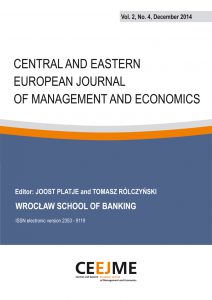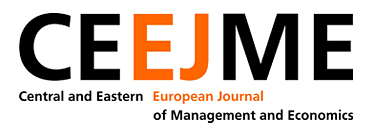 CENTRAL AND EASTERN EUROPEAN JOURNAL OF MANAGEMENT AND ECONOMICS
CENTRAL AND EASTERN EUROPEAN JOURNAL OF MANAGEMENT AND ECONOMICS
Vol. 2, No. 4, 221, Dec. 2014, WROCŁAW SCHOOL OF BANKING
Editor: Joost Platje and Tomasz Rólczyński
Contents: PDF download >>
Cover: PDF download >>
Vol. 2, No. 4, 225-253, Dec. 2014
Evaluation of the Impact of Economic Openness on Labour Productivity in EU Countries
Author: Diana CIBULSKIENĖ, Alma MAČIULYTĖ-ŠNIUKIENĖ, Šiauliai University, Lithuania
Article: PDF download >>
Abstract: With the growing economic integration, globalization, international openness and regionalization, more and more significance is given to competitiveness improvements not only of individual countries but also of groups of countries as a unit. Ability to identify issues of competitiveness improvement in a country or group of countries, approaches of solving such issues and a level of settlement of these issues contribute in the social and economic rate of a region and living standards of its population. One of the most relevant indicators reflecting competitiveness of national or regional economy is productivity. However, labour productivity is among those quantities that have a negative impact on the competitiveness of the EU as a group of countries. To ensure the growth of average labour productivity in EU, it is essential to look for methods and tools helping to prompt productivity in the countries demonstrating low labour productivity. In the light of globalization, one of the factors causing changes in labour productivity of both EU and other countries could be economic openness. Therefore, the aim of the study is to evaluate the impact of economic openness on labour productivity of EU-28 countries.
To achieve the objective, this article reveals the concept of economic openness, identifies indices reflecting economic openness at the theoretical level, and presents the theoretical model of the impact of economic openness on productivity. Having analysed the existing approaches to economic openness, the study is conducted from the perspective of the most popular one stating that economic openness involves trade openness and financial openness. If the presumption that the impact of economic openness on labour productivity may differ in countries of different productivity is accepted, then EU countries can be distributed into two clusters: relatively high and relatively low labour productivity. Afterwards, EU countries are divided into clusters based on indices of trade intensity and FDI intensity. The comparison of the countries falling into the clusters revealed denies the presumption that the countries with higher economic openness are more open. This theory also fails when the countries are ranked according to indicators of labour productivity and economic openness; however, after composing the multiple regression model and introducing pseudo variables, it is established that the impact of FDI intensity on labour productivity is statistically significant, and is observed both in the cluster of relatively high labour productivity and in the cluster of relatively low labour productivity. The impact of trade openness on labour productivity of EU countries has not been confirmed; thus, to achieve growth of labour productivity, financial openness shall be prompted in EU countries.
Keywords: labour productivity, economic openness, trade openness, financial openness
Vol. 2, No. 4, 255-262, Dec. 2014
Organizational Culture and Culture of an Organization in Management
Authors: Beniamin NOGA, Wrocław School of Banking, Poland
Article: PDF download >>
Abstract: Most approaches towards management seem to aim at the most economical use of resources during the accomplishment of a pre-determined goal. Different types of capital (physical, intellectual, social) are elementary in achieving the goal. The role of the different types of capital has changed through time, with increasing emphasis on intellectual and social capital. In this context, this paper presents the main features of organizational culture and corporate culture and their impact on the organization’s management.
Keywords: organizational culture, culture of an organization, management, social capital
Vol. 2, No. 4, 263-268, Dec. 2014
Culture in the Social Teaching of the Roman-Catholic Church
Author: Marian NOGA, Beniamin NOGA, Wrocław School of Banking, Poland
Article: PDF download >>
Abstract: The aim of this paper is to discuss the principles of the social teaching of the Church and the role of culture in the efficiency of economic systems. The authors made an attempt to identify the impact of culture on the operation of an economic system and on its efficiency (or inefficiency) in the light of the social teaching of the Church.
Keywords: Catholic Church, efficiency, economic systems, social teaching
